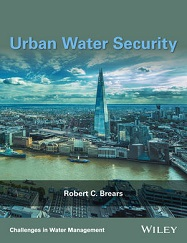Urban water security
Material type: TextLanguage: English Series: Challenges in Water ManagementPublication details: Chichester : Wiley, c2017 Description: XVIII, 299 p. : illISBN:
TextLanguage: English Series: Challenges in Water ManagementPublication details: Chichester : Wiley, c2017 Description: XVIII, 299 p. : illISBN: - 9781119131724
- 363.61091732 BRE
| Item type | Current library | Shelving location | Call number | Copy number | Status | Date due | Barcode |
|---|---|---|---|---|---|---|---|
 Lending Collection
Lending Collection
|
Circulation Section | Circulation Section | 363.61091732 BRE | 2022-23 | Available | 97986 |
About the Author
Robert C. Brears is the founder of Mitidaption, Mark and Focus, is Director on the International Board of the Indo Global Chamber of Commerce, Industries and Agriculture, and a Visiting Fellow (non-resident) at the Center for Conflict Studies at MIIS, Monterey, USA.
Summary:
In the 21st Century, the world will see an unprecedented migration of people moving from rural to urban areas. With global demand for water projected to outstrip supply in the coming decades, cities will likely face water insecurity as a result of climate change and the various impacts of urbanisation. Traditionally, urban water managers have relied on large-scale, supply-side infrastructural projects to meet increased demands for water; however, these projects are environmentally, economically and politically costly. Urban Water Security argues that cities need to transition from supply-side to demand-side management to achieve urban water security. This book provides readers with a series of in-depth case studies of leading developed cities, of differing climates, incomes and lifestyles from around the world, that have used demand management tools to modify the attitudes and behaviour of water users in an attempt to achieve urban water security.
Urban Water Security will be of particular interest to town and regional planners, water conservation managers and policymakers, international companies and organisations with large water footprints, environmental and water NGOs, researchers, graduate and undergraduate students.
